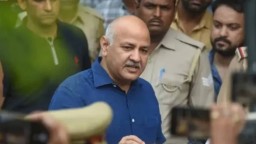Latest News
RESURGENCE OF NEW VERSION OF COLD WAR IN 2024

The period post World War II, from late 40s till disintegration of Soviet Union in early 90s was characterized by an ideological and geopolitical contention often referred to as the Cold War. The globe was practically divided into two spheres of influence, with the United States steering the Western Bloc and the Soviet Union heading the Eastern Bloc. This battle for dominance may not have seen direct military skirmishes, but was visible through proxy conflicts, space races, nuclear brinkmanship, economic assistance programs, and ideological warfare. With fall of Berlin Wall, disintegration of Soviet Union, democratisation of Eastern Europe and abolition of Warsaw Pact in 1991 the geopolitical divide crumbled down. Post-Cold War, the world practically remained unipolar under the US and its allies for a long time. The prevailing cold peace is now caught with the emerging China-Russia alliance threatening US dominated world and the reverberations of the Cold War seem to echo once again.
We currently live in a multipolar world where authority is distributed among several key players, including but not limited to the United States, China, Russia, and a consortium of European powers. Yet now, there is a need for a reality check on whether we are on the verge of another cold war, and global security and stability are at risk or the factors like global collaborations for economic growth, challenges of climate change and the counter terrorism efforts favours continuity of status quo. It may appear that the Cold War has begun, brought upon the West by the aggressive partnership of Xi Jinping and Vladimir Putin, but the neutrality of emerging voices of Global South like India, Brazil and South Africa, economic interdependence and cost affordability with recession looming large on most nations are proving major deterrents to any direct conflicts between the two powers of the day but how long is the real question that is a cause of worry for most world leaders.
A steady decrease in U.S. defence spending might indicate reduced threats to the Western Allies but their compulsions of protecting own geopolitical interests around the world and fight against global terrorism or keeping Sea Lines of Communications (SLOC) safe has presented multiple challenges for the US. Today, issues like Terrorism, Sea Piracy and Cyber Crime needs united efforts by all countries to keep these menaces under control. Russia’s invasion of Ukraine in February 2022 has transmuted into a significant geopolitical crisis and incited a substantial rearrangement of worldwide alliances. Concurrently, Sino- Russian united front on the Ukraine issue and a joint statement in Feb 2023 Summit meeting stating friendship between the two States has no limits with no forbidden areas of cooperation has put the US and allies at lots of discomfort.
The United States, while remaining a dominant global actor, encounters challenges to its hegemony from China - Russia alliance. Europe’s stance is particularly intricate due to its longstanding ties with the United States, geographical closeness to Russia, and growing economic interdependence with China and it is possible that the historical friends on both sides may seek new alliances. Recent diplomatic initiatives and strategic advances like, the United States’ interaction with New Zealand regarding the military and security pact between Australia, the United Kingdom and the United States (AUKUS), improved Indo-US relations and active role of the Quadrilateral Security Dialogue (QUAD) between US, Australia, Japan and India to ensure free, open and prosperous Indo-Pacific and counter China’s growing influence, China’s engagement with almost 150 countries and global organisations through Belt Road Initiative (BRI) and Russian inroads into African and Asian countries are indicative of strategic rearrangements resonant of Cold War dynamics.
The present-day global security environment has become brittle due to war mongering behaviour of North Korean leader Kim Jong, Chinese hostile approach towards Taipei and its claims over South China Sea Islands, resurgent Taliban taking over Afghanistan, Ukraine war and latest Hamas - Israel conflict. Though the Hamas- Israel conflict witnessed major global powers taking sides but the spread of war to other regions was sensibly averted. The United Nations too has not proved to be an effective global forum for convergence of nations to deal with conflicts and global issues of common interest in an amicable manner and the world remains divided house. The global events and environment are conducive to triggering another cold war, may be of a different dimension and shape.
The Intricacies of the Emerging New Cold War and India’s Perspective
In the realm of global politics, there are firm indicators that the world is gradually gravitating towards a new version of the Cold War and the US and its allies are being confronted by China aided by Russia. The new cold war encompasses issues of political governance, economic interdependence, human rights, technology, terrorism, cybercrimes, and environmental changes. Furthermore, the emergence of non-state actors - from multinational corporations and international organizations to cybercriminals and terror groups - adds an additional layer of intricacy. Empowered by technological advancements and globalization, these non-state actors have the potential to shape global events beyond control of states.
India is considered one of the most promising developing nations in the current global order and has emerged as voice of Global South. India has the potential to promote greater capital accumulation, advance scientific and technological development, more production and productivity, conventional and unconventional military might with less vulnerability to external shocks and pressures. As the multipolarity nature of world diminishes and it gets difficult to maintain status quo, India will have to take note of its strategic encirclement by ChinaIran - Pakistan alliance and consider closer alliance with the US and allies to safeguard its own interests but may not be at the cost of reliable partner Russia. The new cold war may not give that luxury of remaining NonAligned any more, yet India will have its national interests as the mainstay of its foreign policy.
THE VIEWS EXPRESSED BY THE AUTHOR ARE PERSONAL
Col Rajesh Bhukar The writer is a Post Graduate in International Studies, Alumni of Defence Services Staff College, Wellington and College of Combat, Mhow [email protected]





















